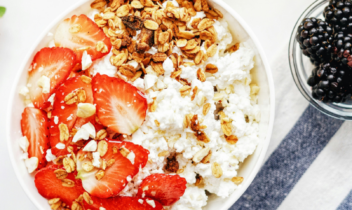TheBUZZ : Multivitamins are the cure-all for the less-than-perfect eater?
WHAT THEY’RE SAYING
Multivitamins provide the same benefits as eating a diet rich in fruits and vegetables.
WHAT WE KNOW
Have you ever thought, “Why can’t I just take a multivitamin to get all of the essential vitamins and minerals that I need and just eat whatever I want?” Wouldn’t that be nice? But if you’re like many Americans who pop a multivitamin each day and neglect eating a balanced diet rich in fruits and veggies, you may need to change your routine.
A typical multivitamin contains 10 to 25 isolated nutrients. The problem associated with isolated nutrients is that many vitamins and minerals are not absorbed as efficiently by the body when they are not in the presence of other vitamins, minerals, or plant compounds. For example, iron is absorbed much better when vitamin C is present and vitamin D is required for calcium to be absorbed by the bones. In addition, while multivitamins may help prevent specific nutrient deficiency, they do not produce the same long-term benefits in the fight against chronic diseases such as cancer and heart disease as does eating a balanced diet.
HOW DO WE KNOW THIS?
A review article published by the Agency for Healthcare Research and Quality found that multivitamins did little to prevent heart disease (the leading cause of death in the United States) as well as cataract or macular degeneration in most populations.¹
Another article published in the Archives of Internal Medicine followed 160,000 postmenopausal women for an average of eight years to determine the effects of multivitamins on cancer, heart disease, and other diseases. The study found that multivitamin therapy had little effect on common cancers, heart disease, or total mortality in postmenopausal women.²
OUR ADVICE
A balanced diet rich in fruits and vegetables, beans and whole grains, and lower in meat, cheese, sweets, and refined foods, will provide all the essential beneficial compounds. Fruits and vegetables contain hundreds of active compounds with a long list of health benefits! Plus, antioxidant qualities provided by the phytochemicals found in fruits and vegetables are best acquired through whole food consumption, not as a pill or an extract. There is not a magic pill to protect you and your family from the development of several leading causes of death.
Certain groups (based on age, gender, and eating patterns) do have certain vitamins and minerals of concern. For example, women have a higher daily iron recommendation than men. And vegetarians and vegans often lack vitamin B12. The Dietary Reference Intakes for Individuals lists specific vitamin and mineral recommendations for specific age and gender groups. Overall, eating a balanced diet that includes adequate fruits and vegetables is the best way to keep you and your family healthy! It’s important to consume your recommended amount each and every day to protect your body from many diseases.
For now, keep it simple…and enjoy a balanced diet that includes fruits and vegetables at each eating occasion for the best prevention!
¹ Semba, R., H. Huang, B. Caballero, et al. “Multivitamin/Mineral Supplements and Prevention of Chronic Diseases.” Johns Hopkins University Evidence-based Practice Center (2006). 06-E012.
² Neuhouser, M., S. Wasserheil-Smoller, C. Thomson, et al. “Multivitamin Use and Risk of Cancer and Cardiovascular Disease in the Women’s Initiative Cohorts.” Archives of Internal Medicine (2009); 16(4): 273-4.
|


